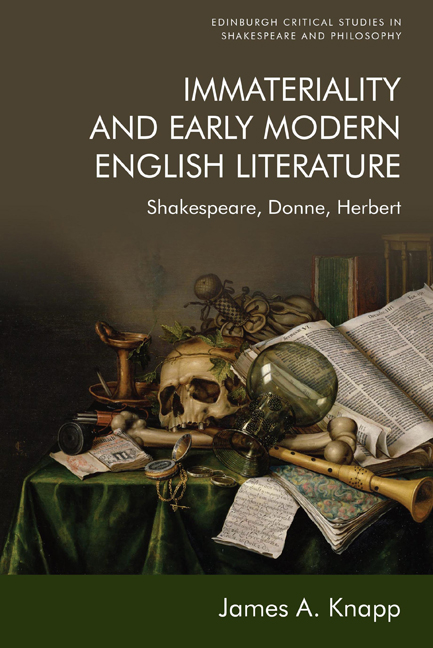6 - ‘When thou knowest this, thou knowest’: Intention, Intuition and Temporality in Donne’s Anatomy of the World
Published online by Cambridge University Press: 10 October 2020
Summary
If man were anything, he's nothing now.
John Donne, An Anatomy of the WorldAlmost from the moment of their publication, Donne's Anniversaries have been criticised for what appears to be a disproportionate relationship between vehicle and tenor: the death of Elizabeth Drury, a young girl Donne had never met or seen, as representative of the spiritual corruption of the world and the future hope of the salvation of the soul. In the First Anniversary, first published in 1611 as An Anatomy of the World, the inadequacy of Drury's death as the model for Donne's representation of ‘the frailty and decay of this whole world’ is especially acute (FA, t.p.). The poem's excesses have led many to question Donne's intentions for the poems, despite his own claim (reported by Ben Jonson) that he was ‘describing the Idea of a Woman and not as she was’, a position he also stressed in a letter to Sir Henry Goodyer: that he had striven for ‘the best [he] could conceive’. Both defences rest on an understanding of ideation that privileges reflection over correspondence. Donne's subject in the Anniversaries, if we are to take him at his word, is not Elizabeth Drury, but his own conceit of earthly corruption and its potential redemption conceived upon reflection – in Frank Manley's phrase, ‘an image of his own imagination to be filled with whatever it possessed’.
The subject of this chapter is the relationship established in the poem between the best that Donne ‘could conceive’ – presumably derived from his reflection on experience – and belief in a place ‘where the stuffe is not such as the rest’ (Second Anniversary [SA], 500). In the process, Donne explores the limits of materiality, the ‘most immaterial parts’ (247) of the temporal world, only to find that they fail to offer access to the true object of his contemplation: the utterly immaterial realm beyond mortal existence. Donne's conceit is the product of his experience of an earthly world marked by ‘frailty and decay’, a world ‘Corrupt and mortall in thy purest part’ (FA t.p., 62).
- Type
- Chapter
- Information
- Immateriality and Early Modern English LiteratureShakespeare, Donne, Herbert, pp. 181 - 222Publisher: Edinburgh University PressPrint publication year: 2020



